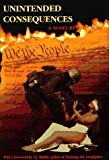
The novel's protagonist, Henry Bowman, shows an early proficiency with firearms, practicing whenever he can find the time. Encouraged by his father, he gathers an impressive firearms collection and gains extensive experience in piloting small aircraft. During college, Bowman is robbed, beaten, and sodomized by a rural gang. The incident nearly destroys him and causes him to become an alcoholic for a period.
While at a gun show in Indianapolis, Indiana, with friend Allen Kane, Bowman publicly embarrasses an agent of the Bureau of Alcohol, Tobacco, Firearms and Explosives (ATF), Wilson Blair. One of Blair's men was trying to trick and entrap a fellow firearms dealer. Blair takes the offense personally, and with the support of the ATF's director, begins to plan revenge. Several years later, Blair and subordinate agents of the ATF plan to frame Henry and his friends as terrorists, smugglers, and counterfeiters. They plan to plant "evidence" when the men are away on vacation. Unbeknownst to Blair, Bowman delays his departure at the last minute due to a work commitment, and is on a friend's property when the agents arrive. Bowman assumes the agents are burglars and engages in a gun battle with them, killing or capturing all and in the process discovering the truth about the raid.
Bowman realizes that his life has been irrevocably changed. He makes Blair record a video taped confession of his illegal actions, then kills Blair and disposes of all forensic evidence of the agents' presence. Afterwards, he hunts down and kills Blair's remaining subordinates. Bowman and his closest friends begin to systematically kill ATF agents around the nation - whom Bowman views as supporting the infringement of citizen's constitutional rights, and abusing government powers - as well as politicians who had supported unconstitutional gun control legislation. Simultaneously Bowman releases the video tape of Blair to CNN, which claims that Blair and his companions have had a change of heart, realize what they are doing is wrong, and are now dedicated to killing other ATF agents. Amidst the national search for Blair and company, Bowman continues to rack up the body count.
Eventually, as the ATF and FBI are unable to effectively track down those responsible for the killings, the President of the United States is forced to give an address to the nation relating his intent to repeal the unconstitutional laws including the National Firearms Act of 1934 and Gun Control Act of 1968.
The story contains several fictionalized accounts of real-life historical events. The author inserts fictional characters, dialog and the unspoken thoughts of real persons into these events. These events are not merely used as settings or backdrops for the action in the novel; instead, detailed treatments of some of these events occupy dozens of pages. In particular, the following events are featured prominently:
Already have an account? Log In Now